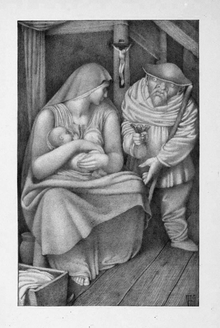The Great Silkie of Sule Skerry
| "The Great Silkie of Sule Skerry" | |
|---|---|

Vernon Hill's illustration of the tale. From Richard Chope's 1912 collection Ballads Weird and Wonderful.
|
|
| Song | |
| Genre | Folk song |
The Great Silkie of Sule Skerry or The Grey Selkie of Suleskerry is a traditional folk song from Orkney. The song was collected by the American scholar, Francis James Child in the late nineteenth century and is listed as Child ballad number 113. There are many different versions of the song, one of which is a part of the epic ballad, The Lady Odivere.
A woman, nursing a baby, laments that she does not know the child's father or where he lives. A man rises up to tell her that he is the father, and that he is a silkie — a changeling that takes the form of a man on the land and a seal in the sea, and that he lives on a remote rocky island called Sule Skerry. He gives her a purse full of gold, takes his son, and predicts that she will marry a gunner (the man who fires the harpoon on a whaling ship) who will shoot both him and their son.
An earthly nourris sits and sings,
And aye she sings, "Ba lilly wean,
Little ken I my bairn's father,
Far less the land that he staps in."
Then ane arose at her bed fit,
And a grumly guest I'm sure was he,
Saying "Here am I, thy bairn's father,
Although I am not comely."
I am a man upon the land,
I am a silkie in the sea,
And when I'm far frae every strand,
My home it is in Sule Skerry."
“It was na weel”, the maiden cried,
“It was na weel, indeed” quo she,
“For the Great Silkie of Sule Skerrie,
To hae come and aught a bairn to me!”
Then he has taken a purse of gold,
And he has laid it on her knee,
Saying, "give to me, my little young son,
And take thee up thy nouris fee.
It shall come to pass on a summer's day,
When the sun shines hot on every stone,
That I shall take my little young son,
And teach him for to swim the foam.
And thou shalt marry a proud gunner,
And a very proud gunner I'm sure he'll be,
And the very first shot that e're he shoots,
he'll kill both my young son and me."
An interpolated 5th stanza has also been heard:
'Twas weel eno' the night we met,
When I'd be oot and on my way,
Ye held me close, ye held me tight,
"Just ane mair time ere the break o' day!"
The best known tune today is non-traditional, having been written by Jim Waters in 1954. Child was interested only in the texts of the ballads he collected, and Jim explains that the tune was "just the best I could do as a way to get a fine ballad sung". Over the next two years, he introduced the ballad to the Boston area at a time when "hootnannies" filled the Great Court of MIT on a weekly basis (before recorded folk songs were widely available). Jim Butler added the song to his repertoire, according to his notes, in October 1954, on a page labelled "MITOC Supp.", being the MIT Outing Club addition to his typewritten Child Ballads. Butler taught the song to several people, including Bonnie Dobson. This is the tune that Joan Baez popularized as "Silkie" in the early 1960s.
...
Wikipedia
